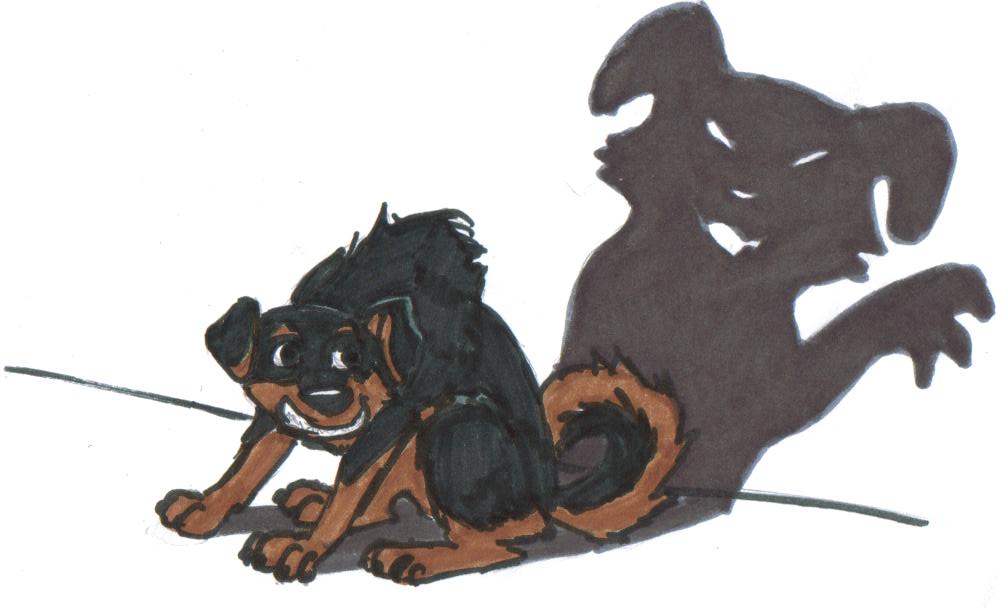Our shadow follows us everywhere. It looms
over us like a dark cloud which cannot only be scary but quite stressful. The
term shadow causes many people to think about their shadow on the ground from
the overhead sun, however there is another, even more personal shadow present.
The shadow I’m discussing is Carl Jung’s definition of a shadow as “the
‘negative’ side of the personality, the sum of all those unpleasant qualities
we like to hide, together with the insufficiently developed functions and the
contents of the personal unconscious.” The shadow represents all the
qualities that a person loathes or that society deems unpleasant. A
shadow is formed through both nature and nurture. Some children are born
with innate qualities such as a “mean streak”, however, the surroundings a
child grows up in also defines the shadow of the child. Few people
embrace the shadow, rather most run in fear of it, but everyone knows that it
is impossible to outrun your shadow.
There are layers upon layers of Jung's theory about the shadow, but I am going to
discuss it in its most basic form as the anti-personality. To many, it
becomes quite stressful as people feel their shadow creep up on them and slowly
start clashing with their “light”, their societal personality. The shadow
embodies everything negative that we don’t want to see ourselves as and when something we don’t want invades our life,
stress ensues and a cycle
begins. In moments of stress your shadow pushes aside your light and
lashes, striking both the target and often the unintended innocent. Often
when we get angry, we are unable to control our shadow. However, if you
are being mean to someone, who does not deserve it, that might stress you out
since in hindsight you may get angry at yourself for having been mean. Your
shadow can lead to stress and stress can lead to your
shadow becoming visible. As a response to this, people will fight their
shadow as if it were the epitome of evil. Brian Seaword mentions in his blog that it is more damaging to fight against
your shadow and it is better to embrace it and learn from it. In Fight Club Edward Norton ends up physically
beating himself up, without knowing it, by fighting his shadow. The
shadow will never disappear, it can only be tamed.
There is also another aspect of the shadow that is frightening and
an obstacle, the fact that the shadow is typically subconscious. The
uncertainty of the shadow is quite formidable and scary. Do you know your
inner beast? Would you recognize it as your shadow? More importantly, do
we want to know? Now this begs the question, how do we control something
we can’t see?
For all the kids reading this, ask yourself, how many times has a parent or
teacher told you that you need to control your anger or that your emotions clouded
your judgment? (I am not saying that
anger is bad, but only in moderate amounts can it be acceptable.) Most likely, the answer is more than
once. Shadows feed on ill perceived
opportunity and pop out when blinded by stress.
Calming
your shadow is a classic example of learning from past experiences, and a
natural part of advancing from childhood to being an adult. Some do it better than others. When you are in a stressed situation, you
need to train yourself to not lash out, but stop and think about what you are
going to do, the calm rational way out.
The cliché
counting to ten may seem silly, but is extraordinarily successful in
reducing your rage or any other shadow emotion. I’ll admit it is quite
difficult to control yourself, but over time,
experience will show that controlling your shadow in a stressful
situation will
prove beneficial in the long run. This is an interesting video on Jung’s shadow.
(On
a completely unrelated topic to shadows, here is some nice, quick, stress-relieving music
from How to Train your Dragon (an excellent movie)) http://www.youtube.com/watch?v=r9TanR_3M0o
